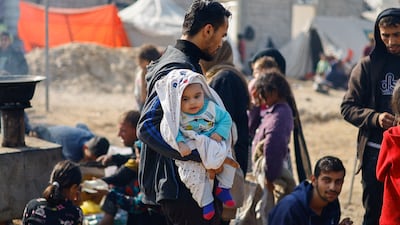Live updates: Follow the latest news on Israel-Gaza
Thousands of doses of vaccines against childhood diseases have begun entering the Gaza Strip through the Rafah border crossing, the Palestinian Health Ministry said on Monday.
Health Minister Mai Al Kaila said the inoculations were to protect against diseases such as polio, measles, rubella and mumps.
An estimated 16,854 children have missed one or more routine vaccinations since Israel launched its military offensive on the Palestinian territory on October 7, increasing the risk of outbreaks of "deadly but preventable diseases, such as measles and polio", the UN said.
Other diseases have also started to spread, with cases of meningitis, skin rashes and chickenpox recorded, as well as "particularly alarming rates of respiratory infections and diarrhoea in children under five", the UN said in a report on Sunday.
The UN children's agency, Unicef, said it had delivered at least 600,000 doses of vaccines for Gaza.
Israel's war in Gaza, launched after Hamas killed an estimated 1,200 people in attacks in southern Israel on October 7, has devastated the besieged Palestinian enclave and its medical infrastructure. Most of the population has been displaced and are living in crowded conditions with poor sanitation, contributing to the spread of disease.
The fighting continued as the world welcomed the new year, with Israeli forces carrying out strikes across Gaza and militants in the territory launching rockets into Israel.
Israel reported no casualties from the barrage of rockets the Al Qassam Brigades said it had fired towards Tel Aviv and its surroundings, while the Health Ministry in Gaza on Monday said at least 156 people were killed and 246 injured in 13 Israeli strikes in the past two days.
The death toll in Gaza now stands at 21,978, ministry spokesman Dr Ashraf Al Qudra said in his daily press briefing, while the number of those injured in Israel air strikes has risen to 57,697.
According to the ministry's tally, 70 per cent of the casualties are women and children.
Al Jazeera correspondent Wael Al Dahdouh, who has lost his own family in the current war, said his hope for 2024 is an end to the conflict and the killing of innocent people.
"I hope all the pain we have experienced comes to an end," he told The National. "As journalists, we pay the price twice: once because we are journalists and again because we are part of this community.
“We have been displaced, lost our loved ones and lost our homes," Mr Dahdouh added.
Noor Arafa, who has been documenting the war from Khan Younis, said she hoped to celebrate her approaching birthday in an atmosphere of peace.
She also hopes to finish writing a book.
“I was supposed to complete it by the end of 2023, so I hope to finish it with the beginning of the new year," she said.
Residents of the Sheikh Radwan district of Gaza city, in the northern part of the enclave where Israel's offensive was initially focused, on Monday said tanks had withdrawn after what they described as the most intense 10 days of bombardment since the war began.
"The tanks were very near, we could see them outside the houses," Nasser, a father of seven living in Sheikh Radwan who did not give his family name for fear of Israeli reprisals, told Reuters.
"We couldn't get out to fill water."
Tanks also pulled out of Gaza city's Al Mina district and parts of Tel Al Hawa, while retaining some positions in the suburb controlling the enclave's main coastal road, residents said.

